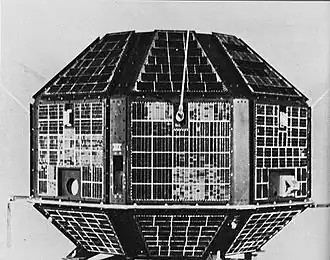INSAT-1C
| Mission type | Communication |
|---|---|
| Operator | INSAT |
| COSPAR ID | 1988-063A |
| SATCAT no. | 19330 |
| Mission duration | 7 years (planned) 13 years (achieved) |
| Spacecraft properties | |
| Bus | I-1K |
| Manufacturer | Ford Aerospace |
| Launch mass | 1,190 kilograms (2,620 lb) |
| Start of mission | |
| Launch date | 21 July 1988 |
| Rocket | Ariane 3 |
| Launch site | Kourou ELA-2 |
| Contractor | Arianespace |
| Orbital parameters | |
| Reference system | Geocentric |
| Regime | Geostationary |
| Longitude | 93.5° East |
| Period | 24 hours |
INSAT-1C was the third in the first generation INSAT series of satellites (termed as INSAT-1) built by Ford Aerospace to satisfy the domestic communication requirement of India. The Govt. agencies using its services were All India Radio, Doordarshan, Department of Space and Indian Meteorological Department[1]
Launch
INSAT-1C was launched from Guiana Space Centre in Kourou using Ariane 3 rocket on July 21, 1988. At launch, it had a mass of 1,190 kilograms (2,620 lb), and an expected operational lifespan of seven years. The satellite was positioned at 93.5° East longitude in geostationary orbit
Payloads
INSAT-1C carried 3 payloads on board to provide communication services to Indian Meteorological Department, Department of Telecommunications and Department of Space:
- Very High Resolution scanning Radiometer (VHRR)
- 12 transponders operating in 2-phases (earth-to-satellite and vice versa).
- Data channel to send data for land based applications.[2]
Mission
INSAT-1C mission was a success and lasted for about 13 years because the satellite got another 6 C-band transponders and 2 S-band transponders when a power system made one more bus[3][4]
See also
References
- ^ "INSAT 1C". NASA. Retrieved 2013-04-10.
- ^ "INSAT-1C". Vikram Sarabhai Space Centre. Archived from the original on 2013-07-05. Retrieved 2013-04-10.
- ^ "Geo Stationary Satellites : INSAT-1C". Indian Space Research Organisation. Archived from the original on 2013-08-18. Retrieved 2013-04-10.
- ^ "INSAT 1". Federation of American Scientists. Retrieved 2013-04-10.
External links
